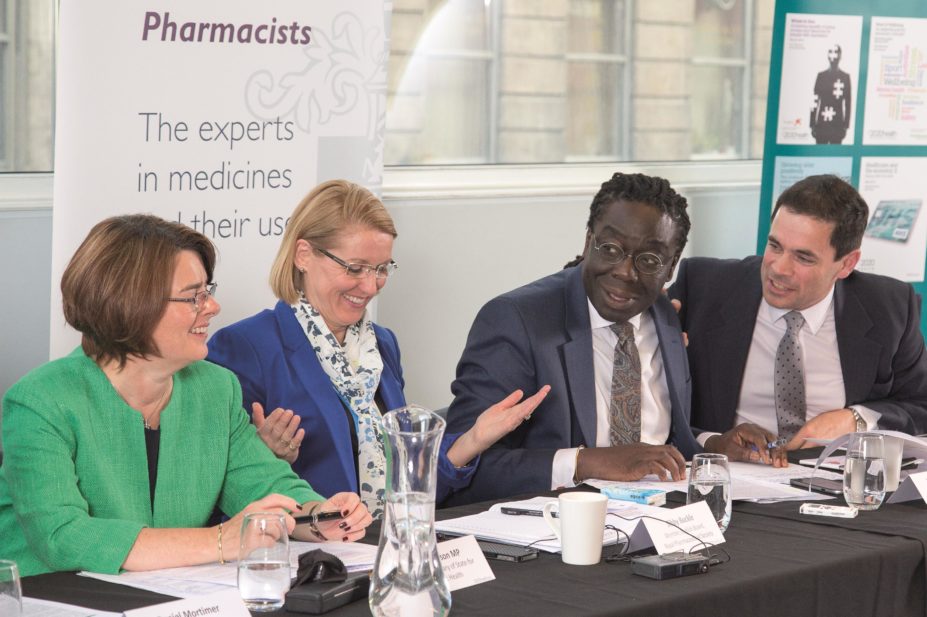
The Royal Pharmaceutical Society (RPS) has recently undertaken its biggest campaign at the Westminster political party conferences, engaging with politicians, healthcare bodies, public policy think tanks and other stakeholders. Conference season gives the RPS access to key audiences in an informal environment that acts as a hothouse for public policy creation and, through participation over a series of weeks, we help shape political party policies. Below are a composite of views from RPS representatives at each conference.
Conservative
Sibby Buckle, member, English Pharmacy Board
The RPS got off to a flying start at the Conservative Party Conference by challenging the Secretary of State for Health Jeremy Hunt at a forum reception to give pharmacists read-and-write access to patient records. He confirmed that the public should get full access to their records by 2017 so, with consent, we should get full access, too.
We also challenged him to include pharmacy when he talks about primary care. Whether this will create a change of heart remains to be seen but we will keep repeating this message.
The RPS participated in a round table debate with Alistair Burt, Minister for Pharmacy, and the royal colleges, British Medical Association, NHS Employers, NHS Confederation and the Royal College of Nursing. We considered the challenges facing the NHS over the next five years, including workforce and funding.
The lack of a national minor ailments service was raised with MP Ben Gummer. Highlighting that the lack of read-and-write access to patient records means GPs are unaware when items are not dispensed (eg, at the patient’s request) in a pharmacy struck a chord with him. He also seemed concerned about the lack of pharmacist representation on health and well-being boards.
Sponsoring a lunchtime fringe session with Jane Ellison MP, public health minister, we raised the importance of pharmacists in public health, citing emergency hormonal contraception, medicines use reviews and smoking cessation as examples. She acknowledged that pharmacists’ ability to interpret complex medical information for patients improves compliance.
Labour
Howard Duff, director for England
Labour came to conference only a few weeks after electing a new leader, who marks a change in direction for the party, and it was clear that this conference was going to be different to those of recent years.
I had several conversations with Heidi Alexander, newly appointed Shadow Secretary of State for Health. RPS team members were wonderful in their ability to be wherever discussion on health and care was starting. So much so that Alexander commented that she’d seen the RPS everywhere she went. That hard work paid off when she talked about her learning at the end of the conference, and committed to enabling pharmacy to play an important role in the new healthcare system under a potential Labour Government in 2020.
The RPS fringe meeting brought together some key stakeholders in the new healthcare environment – the Local Government Association and NHS Confederation. Both organisations support better standards of care for people and patient, some of which will be led by pharmacists in more clinical roles.
I was given a tough task by think tank 2020 Health: two minutes or so to define the aims the profession wanted, why I thought these aims were good for patients and how we can achieve them. I set out a full agenda for the next few years, including pharmacists working in GP surgeries and in care homes to reduce the overuse of antipsychotics, and caring for people with long-term conditions.
Scottish National Party
Aileen Bryson,
RPS practice and policy lead, Scotland
With a cohort of 56 MPs, the Scottish National Party has burst on the political scene and has become a key influencer in public policy. A formal event gave the RPS an opportunity to meet health spokespeople and to get them up to speed with the new roles of pharmacists and the need for read-and-write access to the patient record.
Liberal Democrat
Aileen Bryson, RPS practice and policy lead, Scotland
I was surprised to see a positive, encouraging conference with a great turn out of party members and discussions returning to traditional Lib Dem values without recent internal tensions caused by the previous coalition.
The number of fringe meetings were fewer than recent years, reflecting the reduced number of external organisations present, but they were of high quality and we were able to meet with all politicians important to the RPS.
We met with several members of the House of Lords who had a good overview of the health agenda or were willing to listen and interested in what pharmacists have to offer. I was delighted to be a speaker at a fringe meeting on patient empowerment to improve public health, which we hosted jointly with the NHS Federation and the Local Government Organisation. It was an opportunity to broadcast how pharmacy can contribute to public health on so many levels. The audience were lively, agreeing with our position in general and showing support for a single patient health record. Although the construct of the health service is now different in each of the home countries, the principles guiding us all are identical. We all want to provide excellent patient care. People want the same high standard of service from their pharmacists wherever they are working, with good communication across all the sectors and between everyone involved in their care.
You may also be interested in
The importance of diverse clinical imagery within health education

Government should consider ways to prevent ‘inappropriate overseas prescribing’ of hormone drugs, review recommends
